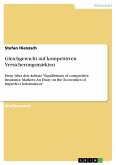The Economics of Imperfect Labor Markets examines the many institutions that affect the behavior of workers and employers in imperfect labor markets. These include minimum wages, employment protection legislation, unemployment benefits, active labor market policies, working-time regulations, family policies, equal opportunity legislation, collective bargaining, early retirement programs, education and migration policies, payroll taxes, and employment-conditional incentives. Written for advanced undergraduates and beginning graduate students, the book carefully defines and measures these institutions to accurately characterize their effects, and discusses how these institutions are today being changed by political and economic forces.
- Expanded, thoroughly revised second edition
- New chapter on labor-market discrimination
- New quantitative examples
- New data sets enabling users to replicate key results of the literature
- New end-of-chapter exercises (with solutions at www.press.princeton.edu)
- Expanded technical appendixes
- Unique focus on institutions in imperfect labor markets
- Integrated framework and systematic coverage
- Self-contained chapters on each of the most important labor-market institutions
Dieser Download kann aus rechtlichen Gründen nur mit Rechnungsadresse in A, B, BG, CY, CZ, D, DK, EW, E, FIN, F, GR, HR, H, IRL, I, LT, L, LR, M, NL, PL, P, R, S, SLO, SK ausgeliefert werden.









